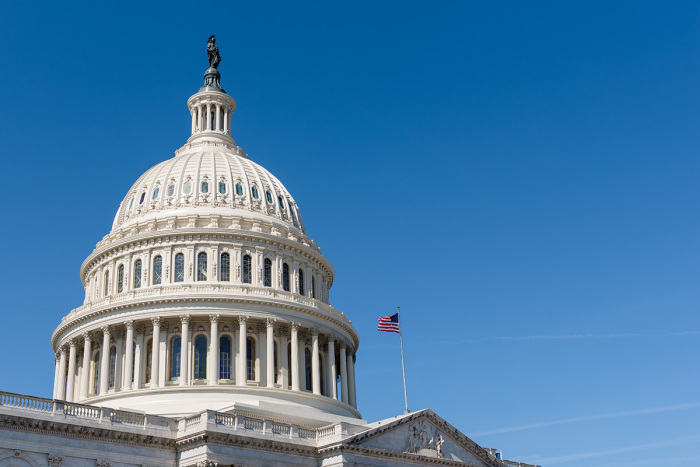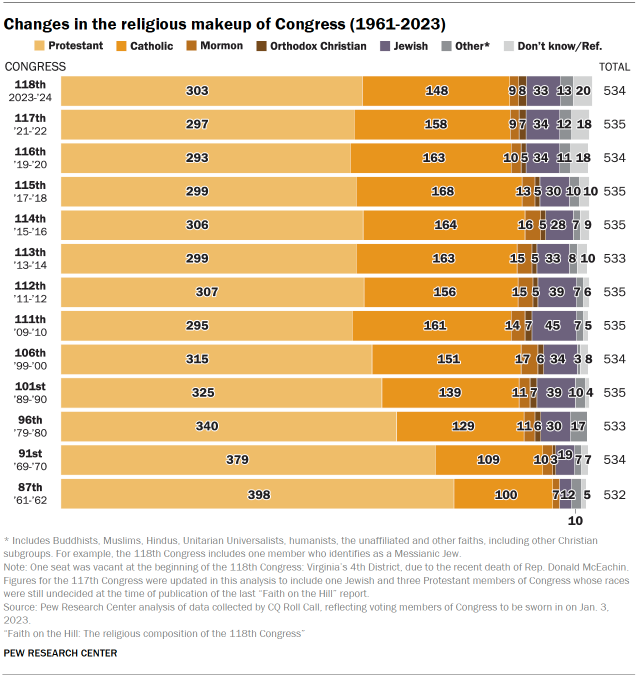Christians continue to dominate Congress even as fewer Americans identify as religious: survey

An overwhelming majority of the incoming members of Congress identify as Christians even as the number of Americans who do so has declined.
Whenever the lower chamber of the 118th United States Congress is sworn in — which is pending the election of the next House Speaker — Christians will comprise 88% of voting members, according to Pew Research Center’s latest Faith on the Hill report.
That number — unchanged from the 117th session — stands in stark contrast with the share of Christians in the general U.S. population, which, since 2007, has declined from 78% to its current level of 63%.
It also marks the second-highest percentage since 1979-’80, when 91% of members of the 96th Congress identified as Christian.
Digging a bit deeper into the data, the actual number of Christians at the start of the 2023-2024 session — 469 in total — makes up the lowest number since Pew first started surveying the religious affiliation of the House and Senate for the 2009-2010 session. The number of Christians in Congress during the last eight sessions was above 470, according to Pew.
The number of lawmakers who do not identify as Christians remains at 65, a slight uptick from 64 in the 117th Congress. Of those, 33 are Jewish, three are Unitarian Universalist, another three are Muslim, along with two Hindus and two Buddhists.
While 29% of American adults are religiously unaffiliated, only one member — Sen. Kyrsten Sinema, I-Ariz., — identifies as such. Sinema is also the first openly bisexual U.S. Senator.
Rep. Jared Huffman, D-Calif., identified as “humanist,” while another 20 members of Congress were categorized as having unknown religious affiliations.
Another sole member, Rep. Anna Paulina Luna, R-Fla., identifies as a Messianic Jew. While Luna also publicly identifies as a Christian, it’s not clear whether Pew counted her as “Christian” or “Other.”

While the vast majority (99%) of congressional Republicans identify as Christians, about 76% of Democrats do the same. But both parties have more identifying as Christian compared with 63% of U.S. adults in general.
Democrats are slightly more likely than Republicans to identify as Catholic (31% vs. 25%), while Republicans are far more likely to identify as Protestant by a margin of 69% to 44%.
Christians also dominate both the House and Senate, with similar Protestant majorities (57% and 56%, respectively) in each chamber.
Among those Protestants, Baptists hold 13% of the House, slightly larger than the 10% in the Senate. Episcopalians, Presbyterians and Lutherans, meanwhile, hold larger majorities in the Senate.
The number of Catholics in the House (28%) is slightly more than the Senate (26%). While the House has eight Orthodox Christians, the Senate has zero who identify as such.
The analysis by Pew Research Center was based on data from CQ Roll Call on the religious affiliations of members of Congress. While the CQ questionnaire asked members about their religious affiliation, if any, it did not attempt to measure their religious beliefs or practices.
As of Thursday night, Rep. Kevin McCarthy, R-Calif., lost an 11th vote to become the Speaker of the House, having failed to dislodge the resistance from a sizable minority of Republican members. Republicans won a narrow majority of 222 seats in the House in the midterm elections last year.
Former President Donald Trump weighed in on the issue on Truth Social Wednesday morning, expressing support for McCarthy and imploring Republican members to “not turn a great triumph into a giant & embarrassing defeat.”
For the fifth ballot on the third day of voting, Rep. Warren Davidson, R-Ohio, a member of the conservative House Freedom Caucus, nominated McCarthy for Speaker, pleading with “all of my Republican colleagues” to “let cooler, more rational heads prevail.”
Rep. Lauren Boebert, R-Colo., nominated Rep. Byron Donalds, R-Fla., for speaker, arguing that the second-term congressman is better suited for the position and urging McCarthy to abandon his bid for Speaker.
Ian M. Giatti is a reporter for The Christian Post. He can be reached at: ian.giatti@christianpost.com.




























